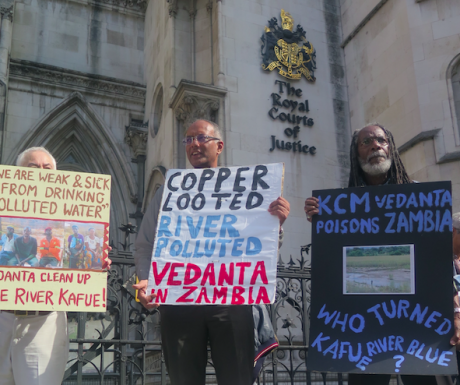By
Zambian villagers await a landmark judgement that could help hold British companies to account for their actions abroad.
Over 1,800 people from farming and fishing communities near Chingola, Zambia are waiting to hear if they can make a claim for damages in the English courts against UK mining company Vedanta Resources and its subsidiary Konkola Copper Mines (KCM).
A decision from London’s Court of Appeal is expected by the end of the summer. If the villagers are successful, it could become easier in future for multinational companies based in the UK to be held to account for alleged human rights and environmental abuses in other countries.
Hundreds of people living near Chingola were hospitalised due to water contamination from sulphuric acid and other chemicals from a KCM-owned mine in 2006.
“We have no water source apart from the river and it’s totally polluted,” villager Leo Chikopela told campaign group Foil Vedanta. “Most of us are very weak and have constant stomach pains. When we bathe using this water our skin itches.”
Local people have also reported deaths after their relatives drank from a local river.
The villagers were previously awarded compensation in the Zambian High Court, but KCM appealed. In 2015 the Supreme Court upheld the guilty verdict but removed the compensation. Vedanta argues that it does not have a duty of care to claimants potentially polluted by the activity of its subsidiary, KCM. Lawyers for the villagers argue that taking the case to the UK is the only way the villagers will get justice.
Vedanta’s track record on the environment and human rights is questionable. It was excluded from Norwegian Pension Fund investments due to an “unacceptable risk” that the company will “cause or contribute to severe environmental damage and serious or systematic human rights violations.”
Mining companies control key mineral resources across the world, and have impacted on land based communities and indigenous peoples through associated forced evictions, pollution, and violence in or near mine areas. Often local people see little of the profits, despite the exploitation of their mineral rich land and the environmental and health consequences.
“The environmental racism of copper mining companies, and the impunity they enjoyed during Rhodes’ British South African Company era is continuing to haunt Zambia through the colonial legacy issues of KCM/Vedanta,” said Samarendra Das from Foil Vedanta.
London is a key investment hub for extractive/mining industries. Major lobbyists the International Council on Mining and Metals (ICMM) are based there, as is metals price fixing mechanism the London Metal Exchange, and precious metals trader, the London Bullion Market Association (LBMA). Many multinational mining companies also maintain links with London through trading on the London Stock Exchange which offers them a ‘cloak of respectability’.
“Being listed on the London Stock Exchange offers companies an explicit air of credibility, because the LSX presents itself as providing strict oversight around who gets a listing and who doesn’t,” explains Liam Barrington-Bush, former Communications Worker at the London Mining Network. “In practice there is not a lot of scrutiny that these companies have to undergo, in terms of anything ethical, environmental or social, to get themselves listed.”
While London-based and -listed companies are benefiting from the natural resources of far flung countries – at the expensive of local people – they are not always paying what they should for the privilege.
A 2016 War on Want report titled The New Colonialism (pdf), showed that 101 London Stock Exchange listed companies had mining operations in 37 sub-Saharan African countries, collectively controlling over $1 trillion worth of Africa’s oil, gold, diamonds, coal and platinum. Of the 101 companies, 25 of them were incorporated in tax havens.
While companies are making money from Africa’s resources, the continent is losing it. In 2015 Africa received nearly $162 billion in aid, loans, foreign investment and remittances, but lost $203 billion thanks to multinational corporations, debt payments, tax dodging and the costs imposed by climate change. In other words, the rest of the world received over $41 billion a year from African countries – money that could have been spent on basic needs such as healthcare and education.
Vedanta has been accused of tax dodging in the past through under-pricing copper sold through KCM in order to pay less tax in Zambia.
As the Vedanta AGM takes place in London on Monday 14 August, a Global Day of Action against will take place – with events in Zambia, India and the UK – putting further pressure on Vedanta over the Zambia case and other communities affected by pollution, human rights abuses and tax evasion around the world.










